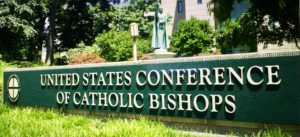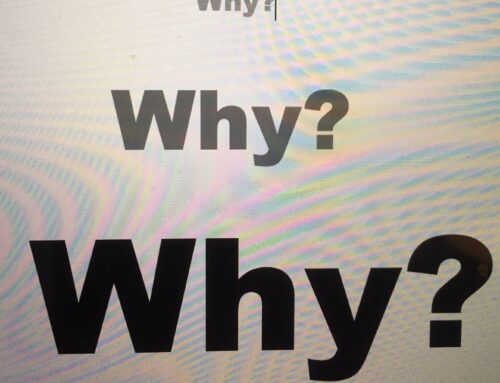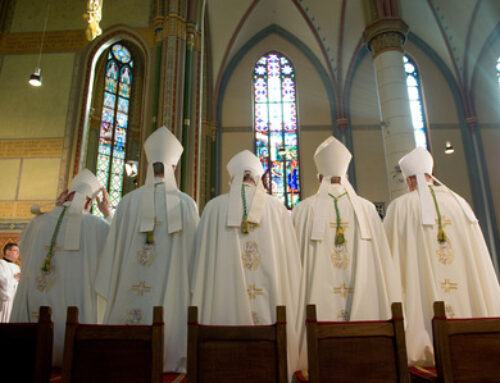 On May 1, 2021 San Francisco Archbishop Salvatore Cordileone issued a pastoral letter on Catholic teaching concerning abortion. Soon afterward, Lauretta Brown interviewed him. The letter is interesting for its expression of the Catholic view of the issue. The interview is, a way, even more interesting because the interviewer’s excellent questions elicited information beyond that in the letter and produced valuable insight into both hierarchical thinking and the laity’s confusion.
On May 1, 2021 San Francisco Archbishop Salvatore Cordileone issued a pastoral letter on Catholic teaching concerning abortion. Soon afterward, Lauretta Brown interviewed him. The letter is interesting for its expression of the Catholic view of the issue. The interview is, a way, even more interesting because the interviewer’s excellent questions elicited information beyond that in the letter and produced valuable insight into both hierarchical thinking and the laity’s confusion.
I will begin by giving a brief overview of the letter and then look more closely at the interview.
A key point in the Archbishop’s letter is that “those who kill or assist in killing the child (even if personally opposed to abortion), those who pressure or encourage the mother to have an abortion, who pay for it, who provide financial assistance to organizations to provide abortions, or who support candidates or legislation for the purpose of making abortion a more readily available ‘choice’ are all cooperating with a very serious evil,” adding that such cooperation is “never morally justified.” Furthermore, that “anyone who actively works to promote abortion shares some of the guilt for the abortions performed because of their actions.”
Another key point is that “when public figures identify themselves as Catholics yet actively oppose one of the most fundamental doctrines of the Church . . . [such as] the absolute prohibition of taking innocent human life — we pastors have a responsibility both to them and to the rest of our people . . . to call them to conversion and to warn them . . . [to] amend their lives.”
Now I will turn to the interview, first stating or paraphrasing each of Brown’s questions, next quoting the Archbishop’s answer, and then commenting on that answer.
Brown: “Please explain why you’ve released this pastoral letter at this moment.”
Cordileone: “It has been on my mind for a long time, the need to say or do something clearly on this issue, because there’s so much confusion in the minds of our people. I decided that the best thing, at least initially, is to issue a teaching document. That’s the only way [the reality about abortion] can be promoted — if people don’t really recognize how horrendously evil this is — so I needed to expose that. This letter was a long time in the making, and it was starting to come together last year; but I decided that I should release it after the election because I was afraid people would confuse this with some kind of a political ploy. I didn’t want it to be hijacked by one side or the other for a political purpose. I wanted to stay out of that, so I waited until after the election to release it.” [Emphasis added]
Comment: The Archbishop deserves credit for addressing the issue, but it has been around since the 1960s, so it is fair to wonder why hasn’t it been addressed sooner by the U. S, Council of Catholic Bishops (USCCB). Not only did they not address it, but they have criticized Father Frank Pavone for doing so and many gave no support to the pastor who denied Biden communion a couple of years ago. As for the Archbishop’s stated reason for withholding the pastoral letter until after the election, it makes no sense. The embarrassment of being thought overly political paled in comparison to the danger of electing a man who was certain to increase the murdering of children in the womb, while denying re-election to a pro-life president who appointed several hundred pro-life lower court judges and three pro-life Supreme Court judges. Cordileone’s choice amounted to abetting the perpetuation of the same “horrendously evil” practice against which he wrote the pastoral letter!
From the standpoint of logic, the interviewer’s next question was a perfect follow-up.
Brown: “Our country is currently led by a president who publicly presents himself as Catholic and yet celebrates and advances abortion. Given the scandal and confusion that might cause, what sort of action might be taken by his Washington, D.C., or Delaware bishops, the USCCB or even the Vatican in addressing that?”
Cordileone: “That’s where it’s really up to each bishop within his own conscience to make that deliberation. He’s the shepherd of his local Church. He’s the teacher in his local Church, and there can be different pastoral judgments from one bishop to another. There are a lot of factors to weigh. It’s not like in civil law — where you break the law, you get punished — because canon law is about the salvation of souls.” [Emphasis added]
Comment: The fallacy here is transparent. If the Archbishop were to pass a fellow prelate lying in a ditch, would he walk on or help him out of it? The latter action would not be just a kindness; it would be a moral obligation. And the obligation is precisely the same if the ditch is cognitive rather than dirt and stone. What is more, Cordileone’s phrase “different pastoral judgments from one bishop to another” clearly implies moral relativism, which the Church has condemned for more than a century, and for good reason—it undermines the very foundation of the Gospel.
The interviewer’s next question was precisely the right one at that point, albeit one that was awkward for the Archbishop.
Brown: “House Speaker Nancy Pelosi, D-Calif., resides in your own archdiocese. Would you address [whether] she should be continuing to present herself for Communion, as she does, given her statements for and support of abortion?”
Cordileone gave a long response that veered away from the question at the outset and never returned to it.
Comment: The Archbishop’s non-answer gives new meaning to Shakespeare’s line in Hamlet, “hoist with his own petard.” That non-answer implies that throughout the “long time” that his mind was focused on the issue of abortion-supporters receiving communion, the most prominent politician in his diocese, Nancy Pelosi, who has done exactly what he is concerned about, never came to his mind. If that is the case, what does it say about his thought processes? It is not an idle question.
Brown: “Bishop Robert McElroy of San Diego had a piece in America magazine arguing that denying Communion was ‘weaponizing’ the Eucharist for political ends and that denying someone Communion over their abortion stance represents ‘a theology of unworthiness and exclusion.’ What is your response to that?”
Cordileone: “In the end, the bishops have to respect each other’s decision in the matter because each bishop has to make that decision in accordance with his own conscience; and it’s to Almighty God that the bishop will have to render an account for the decision he made within the sanctuary of his conscience. It’s not to his brother bishops, it’s not to Catholic bloggers, it’s not to politicians, it’s not to news reporters, but to God and to God alone. We have to trust each bishop is doing the best he can in accordance with his conscience and respect that.” [Emphasis added]
Comment: Does he really believe that bishop’s decisions have to be respected because they are made “in accordance with conscience?” Wow! No, double Wow!! On its face, that view is fallacious on two counts. First, we should respect people when they follow their consciences, but we should not necessarily respect the decisions prompted by their consciences. Conscience is shaped both by natural endowment and social conditioning, and the validity of its guidance can vary significantly from one person to another and one case to another. Simply said, conscience can be mistaken. As I explain in Thinking Critically About Ethical Issues (McGraw-Hill), “We should follow conscience, but not blindly. True freedom, true individuality, and real moral growth lie in examining conscience, evaluating its promptings, purging it of negative influences and error, and reinforcing it with searching ethical inquiry and penetrating ethical judgment.”
This explanation is completely in accord with traditional Catholic teaching. In contrast, Cordileone’s belief that he must respect his fellow bishops’ decisions is mistaken. That he and presumably other bishops have this false belief explains why they often fail to speak out where speaking out is desperately needed, and support others when there is good reason to disagree with them.
That last sentence prompts further, deeper thought.
How many other bishops share Cordileone’s belief that they should respect their fellow bishops’ decisions without examining them critically? Is he in the minority or the majority? These are significant questions because if many share that belief, there is fertile ground for a host of dangerous consequences including these: Choosing to remain silent, especially about thorny issues, in order to avoid criticism and/or gain favor (also known as “going along to get along.”) Looking to what other bishops think instead of thinking for oneself—psychologists call this “Groupthink.” Putting loyalty to hierarchical cohesion above service to God and His people, in extreme cases to the point of ignoring the Gospel. That false loyalty can lead to intellectual pretense, notably to denying their fallibility and, as a result, their need to acknowledge their mistakes and make amends. It can lead, as well, to the dishonest and erroneous notion that if they never admit to being wrong, the laity will think they are always right.
Some might dismiss the last paragraph as unfair speculation. They would ask, “Where is the evidence that a significant number of bishops behave as you indicate? What statements or actions can you point to as likely ‘dangerous’ consequences of the belief Cordileone expressed? And what examples can you offer that other bishops have embraced that belief?” Fair questions all, so let me answer them.
The most obvious consequence of the bishops’ assuming that their colleagues’ decisions were automatically deserving of respect was that many of them remained silent about clerical pedophilia; some compounded that sin by moving the pedophiles from parish to parish to hide the sinful/criminal behavior.
A similar consequence was the failure of a number of bishops to purge the “Lavender Mafia” (Andrew Greeley’s term) from their seminaries.
Another consequence was the failure of many if not most bishops to acknowledge Trump’s strengthening of U.S. ties with Israel, his choice of Jerusalem as Israel’s capital, his moving of the U.S. embassy there, and his unprecedented, successful efforts to bring Arab nations to the peace table with Israel.
Yet another consequence was the failure of many bishops to credit Trump with bringing U.S. troops home and keeping this country from armed conflicts throughout his term.
A particularly damaging consequence was their forceful opposition to Trump’s rational and responsible plan to control illegal immigration, to the point of falsely classifying him and the millions of Catholics who supported him as insensitive to the plight of the poor and thus offensive to God.
Another consequence was their silence about—or even embrace of—the slanderous mainstream media narrative that Trump incited hatred, racism, xenophobia, homophobia, and other terrible behaviors. When I say “embrace of” I am including the numerous pastoral documents that recited the media litany of derogation without necessarily mentioning Trump’s name, yet knowing that their audience would fill it in.
Still another consequence of not critically examining their own behavior and that of their colleagues was their consistent failure to praise President Trump for his steadfast pro-life choices in appointing judges and justices, for his opposition to funding Planned Parenthood with tax dollars, and for his advocacy of school vouchers. In other words, their failure to credit Trump for actively advancing the very anti-abortion cause they now, belatedly, believe to be in jeopardy!
The most dramatic impact of these consequences was the election of Joe Biden. The unfortunate effects of that consequence are evident in each day’s news. Some bishops have actually begun to criticize Biden for his continuing mistakes and failures. Sadly, though not surprisingly, they are doing so with greater politeness and kindness than they ever showed toward Trump’s successes.
For many months, the hierarchy in the U.S. and elsewhere have been paying increased attention to the decades-long decline in the number of Catholics who go to confession, attend Mass, or send their children to Catholic schools and their sons to seminaries. The bishops are appropriately considering ways to reverse the decline and promote renewal in the Church. That issue is complicated and there are many factors that must be addressed, many of them not directly related to the subject of this essay. I submit, however, that among the most important ways to reverse the decline is for the hierarchy to abandon the behaviors explained above, especially the groupthink, false loyalty, and erroneous notions and to start providing the enlightened leadership the Gospel demands and the laity deserve.
Copyright © 2021 by Vincent Ryan Ruggiero. All rights reserved



